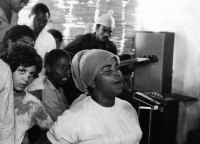 How a music shaped by slavery, epidemics, famine and mass migration travelled the world, narrating stories of suffering and resistance. Over time, morna, also known as “música rainha” (“queen music”), underwent several changes to its melodic and rhythmic characteristics, becoming the slower, more mournful version heard today. Characterised by three dimensions of melody, poetry and dance, morna is often sung in Kriolu, Portuguese-based Creole, though it can be instrumental, too.
How a music shaped by slavery, epidemics, famine and mass migration travelled the world, narrating stories of suffering and resistance. Over time, morna, also known as “música rainha” (“queen music”), underwent several changes to its melodic and rhythmic characteristics, becoming the slower, more mournful version heard today. Characterised by three dimensions of melody, poetry and dance, morna is often sung in Kriolu, Portuguese-based Creole, though it can be instrumental, too.
Stages
26.05.2021 | by Beatriz Ramalho da Silva